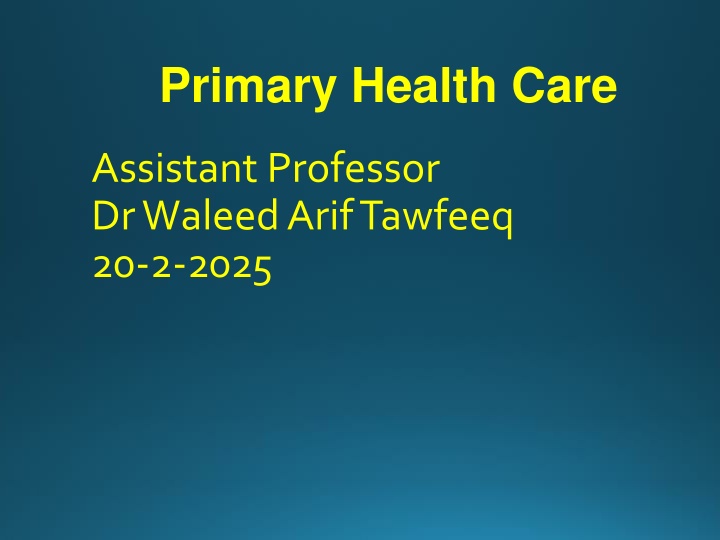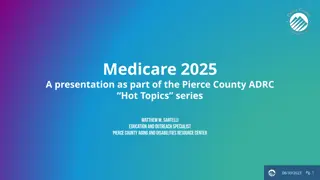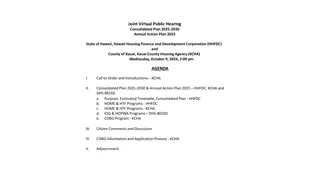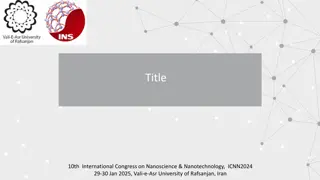
Primary Health Care Learning Objectives and Definitions by Dr. Waleed Arif Tawfeeq
Explore the key learning objectives and definitions related to Primary Health Care (PHC) by Assistant Professor Dr. Waleed Arif Tawfeeq. Understand the importance of PHC, its principles, pillars, levels, and elements. Discover factors and determinants affecting health, levels of care, and the significance of primary, secondary, and tertiary health care. Enhance your knowledge of health definitions and WHO's perspective on well-being. Dive into developing a functional referral system in PHC for improving healthcare systems.
Download Presentation

Please find below an Image/Link to download the presentation.
The content on the website is provided AS IS for your information and personal use only. It may not be sold, licensed, or shared on other websites without obtaining consent from the author. If you encounter any issues during the download, it is possible that the publisher has removed the file from their server.
You are allowed to download the files provided on this website for personal or commercial use, subject to the condition that they are used lawfully. All files are the property of their respective owners.
The content on the website is provided AS IS for your information and personal use only. It may not be sold, licensed, or shared on other websites without obtaining consent from the author.
E N D
Presentation Transcript
Primary Health Care Assistant Professor DrWaleed ArifTawfeeq 20-2-2025
PHC Learning Objectives: To define PHC& its concept To state requirements ,principles , pillars, & levels of PHC . To describe elements & Strategies of PHC ,. To identify current health system Problems. To list Obstacles to PHC, limitations of medical care system. To apply for developing a functional Referral system in PHC.
WHO definition of health Health is . a state of complete physical, mental and social wellbeing and not merely the absence of disease or infirmity
Factors affecting health parenting styles gender family dynamics age geographical mobility employability HEALTH social resources culture family finances biological factors McMurray, A. (2003) pg.12 Slide 8
Determinants of health Generally, the context in which an individual lives is of great importance for his health status and qualityoflife. It is increasingly recognized that health is maintained and improved not only through the advancement and application of health science, but also through lifestyle choicesoftheindividual and society. the efforts of
Definition of health it is a state of complete physical , mental ,social and spiritual wellbeing , the ability to lead economically productive merely the absence infirmity. a socially life and of disease and not or
Levels of Care Primary health care Secondary health care Tertiary health care
Primary health care The first level of contact between the individual and the health system. Essential health care (PHC) is provided. A majority of prevailing health problems can be satisfactorily managed. The closest to the people. Provided by the primary health centers.
Secondary health care More complex problems are dealt with. Comprises curative services Provided by the district hospitals The 1streferral level
Tertiary health care Offers super-specialist care Provided by regional/central level institution. Provide training programs
The Basic Requirements for PHC (the 8 A s and the 3 C s) Appropriateness Availability Adequacy Accessibility Acceptability Affordability Assessability Accountability
The Basic Requirements for PHC (the 8 A s and the 3 C s) Completeness Comprehensiveness Continuity
Appropriateness Whether the service is needed at all in relation to essential human needs, priorities and policies. The service has to be properly selected and carried out by trained personnel in the proper way.
Adequacy The service proportionate to requirement. Sufficient volume of care to meet the need and demand of a community
Affordability The cost should be within the means and resources of the individual and the country.
Accessibility Reachable, convenient services Geographic, economic, cultural accessibility
Availability Availability of medical care means that care can be obtained whenever people need it.
Assessability Assessabilitymeans that medical care can be readily evaluated.
Accountability Accountability implies the feasibility of regular review of financial records by certified public accountants.
Completeness Completeness adequate attention to all aspects of a medical problem, prevention, early detection, diagnosis, treatment, follow up measures, and rehabilitation. of care requires including
Comprehensiveness Comprehensiveness of care means that care is provided for all types of health problems.
PHC requires a comprehensive approach that is based on the following interventions : Promotive addresses basic causes of ill-health at the level of society Preventive reduces the incidence of disease by addressing the immediate and underlying causes at the individual level 25 19 22
Curative reduces the prevalence of disease by stopping the progression of disease among the sick. Rehabilitative reduces the long-term effects or complications of a health problem. 25 19 23
Continuity Continuity of care requires that the management of a patient s care over time be coordinated among providers.
Community participation The community can and should participate in provision of health program through certain steps to be responsible for health and welfare for themselves and they should know about their health problems and community; they can be what is called influential people help in the community; composition of the 25 19 25





















